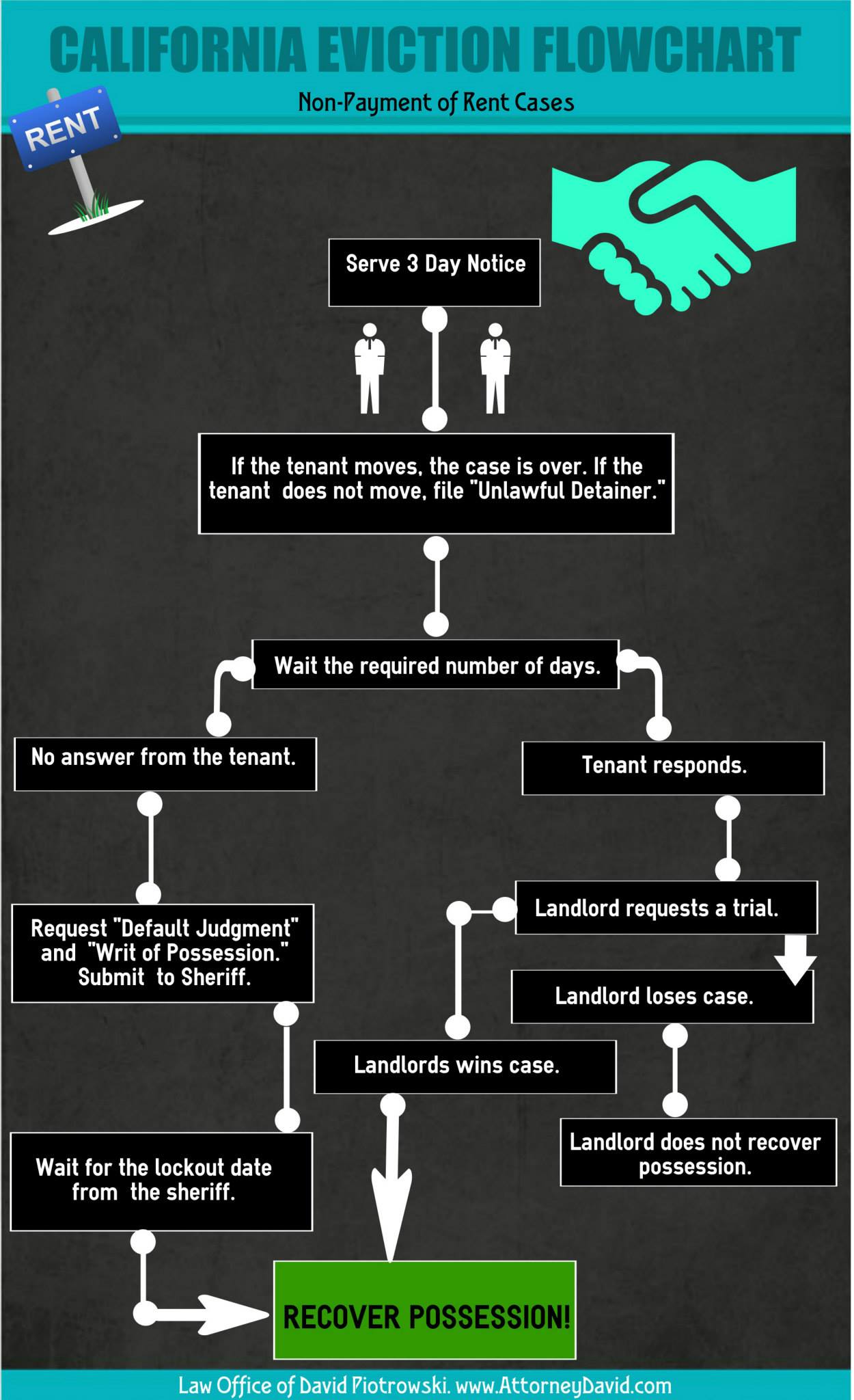Top 10 Most Frequently Asked Questions (California) – Landlord/Tenant
SCROLL FURTHER DOWN
(Via the Housing Rights Center)
(1) How many days do I have to wait to get my security deposit back?
California Civil Code Section 1950.5 requires that within three weeks (21 days) after a tenant has vacated the unit, the owner must either: 1) return the security deposit to the tenant, 2) furnish a copy of an itemized statement indicating the amount of any part of the security deposit used (e.g. for unpaid rent, repairs, etc.), or 3) a combination of #1 and #2.
Effective January 1, 2003, rental property owners must perform a walk-through with the residents no earlier than two (2) weeks prior to the termination of the tenancy. The intent of this new law is to give residents an opportunity to remedy identified deficiencies in the unit prior to move out.
If your building falls under rent control in areas such as the City of Los Angeles, Beverly Hills, or West Hollywood, a landlord may be required to pay interest on your security deposit.
(2) Can a landlord increase the rent more than two times per year?
If you have a lease for more than 30 days (e.g. 1-year lease), your rent cannot be increased during the term of the lease, unless the lease allows rent increases. If you have a periodic rental agreement (month-to-month), your landlord can increase your rent, but must give you proper advance notice in writing. (Civil Code Section 827 (b))
If you live in a building that is under rent control in areas such as the City of Los Angeles, Beverly Hills, or West Hollywood, your landlord can only raise your rent a set percentage once every twelve months.
(3) How much can a landlord legally raise the rent?
Under California Law there is currently no maximum limit for rent increases.
As of January 1, 2001, a landlord must give the tenant at least 30 days’ advance notice if the rent increase is 10 percent (or less) of the rent charged at any time during the 12 months before the rent increase takes effect. A landlord must give 60 days’ advance notice if the rent increase is greater than 10 percent. (Civil Code Section 827b.)
Buildings under rent control in cities such as City of Los Angeles, Beverly Hills and West Hollywood, fall under different rules. For example, in Los Angeles, owners of buildings that fall under rent control can only raise the rent 5% per year. Landlords can raise the rent one additional percent (1%) for gas and/or one percent (1%) for electricity when the landlord pays all the costs of either of these services for the tenant.
(4) How much advance notice must my landlord give if he wants a tenant to move out of the rental unit?
Landlords are required to provide a 60-day advance notice to a resident if the landlord elects to terminate a tenancy. If the tenant has resided in the unit less than 1 year, the landlord is only required to give a 30-day notice. (Civil Code Section 1946.1)
In rent control areas, a landlord may be limited to certain reasons for requesting a tenant to vacate the premises. For example in the City of Los Angeles, there are 12 legal reasons to request that a tenant vacate a unit outlined in the Rent Stabilization Ordinance. Two of them are failure to pay rent and using a rental unit for any illegal purpose.
(5) Is a landlord obligated to pay relocation fees?
A landlord is required to pay relocation fees if the building falls under rent control in areas such as the City of Los Angeles, Beverly Hills, and West Hollywood. There are certain conditions under which a landlord in these areas is required to pay relocation assistance. For example, in the City of Los Angeles, when a landlord requires a tenant to vacate so that he/she, a spouse, parent(s), child(ren), or manager can occupy the unit, the landlord is required to pay relocation assistance.
A landlord is also required to pay relocation if the landlord is converting rental units to condominiums.
(6) What is rent control?
Rent control ordinances limit or prohibit rent increases and notices to vacate tenancy. Some California cities have local ordinances but each community’s ordinance is different. As stated above, in the City of Los Angeles, rent increases are limited to a certain percentage each year. Also, some rent control ordinances only allow landlords to evict tenants for “just cause.” This means, the landlord must state and provide a valid reason for terminating a month-to-month tenancy. In California, the cities that have rent control are the City of Los Angeles, Beverly Hills, West Hollywood, Santa Monica, Berkeley, Campbell, East Palo Alto, Fremont, Hayward, Los Gatos, Oakland, Palm Springs, San Francisco, San Jose and Thousand Oaks.
(7) When can a landlord enter an occupied rental unit?
California laws gives five (5) reasons that a landlord can legally enter a rental unit.
(1) In an emergency.
(2) When the tenant has moved out or has abandoned the rental unit.
(3) To make necessary or agreed-upon repairs, decorations, alterations, or other improvements.
(4) To show the rental unit to prospective tenants, buyers, or lenders, or to provide entry to contractors or workers who are to perform work on the unit.
(5) If a court order permits the landlord to enter.
Effective January 1, 2003, California Civil Code 1954 states that except in the first two situations above (emergencies and abandonment), the landlord must give the tenant twenty-four (24) hours written notice before entering the unit.
The notice may be provided by the owner in one (1) of the following ways:
-Personally delivered to the tenant twenty-four (24) hours prior to entry;
-Left with someone of suitable age at the premises twenty-four (24) hours prior to entry;
-Left on, near, or under the usual entry door of the premises twenty-four (24) hours prior to entry; or
-Mailed to the resident six (6) days prior to the intended entry.
If the owner or agent’s reason for entry is to exhibit the residential unit to prospective or actual purchasers, the notice may be given orally, in person, or by telephone. If the owner or agent has notified the resident in writing within 120 days of the verbal notice that the property is for sale and that the owner may contact the resident orally for the purpose of showing the unit, a twenty-four (24) hour verbal notice is presumed reasonable. At the time of entry, the owner or agent shall leave written evidence of the entry inside the unit.
(8) How much notice in advance does a tenant have to give before moving?
To end a periodic rental agreement (month-to-month), a tenant must give the landlord proper written notice before vacating. If you pay rent monthly, you must give at least 30 days advance notice. If you pay rent weekly, you must give at least 7 days advance notice. (Civil Code Section 1946)
(9) How do I know if I have been a victim of housing discrimination?
Unlawful housing discrimination can take a variety of forms. Under the federal Fair Housing Act and California’s Fair Employment and Housing Act, it is unlawful for a landlord, managing agent, real estate broker, or salesperson to discriminate against any person because of the person’s race, color, religion, gender, sexual orientation, marital status, national origin, ancestry, familial status, source of income, or physical or mental disability. If you are being denied housing because of your personal characteristics you may be the victim of housing discrimination!
(10) What makes my unit legally “uninhabitable?”
California Civil Code Section 1941.1 states that a dwelling unit is considered to be uninhabitable (unlivable) if it substantially lacks any of the following:
-Effective waterproofing and weather protection of roof and exterior walls, including unbroken windows and doors.
-Plumbing facilities in good working order, including hot and cold running water, connected to a sewage disposal system.
-Gas facilities in good working order.
-Heating facilities in good working order.
-An electric system, including lighting, wiring, and equipment, in good working order.
-Clean and sanitary buildings, grounds, and appurtenances free from debris, filth, rubbish, garbage, rodents and vermin.
-Adequate trash receptacles in good repair.
-Floors, stairways, and railings in good repair.
-Contains lead hazards such as deteriorated lead-based paint, lead-contaminated dust, lead-contaminated soil, or disturbing lead-based paint without containment. (Health and Safety Code Section 17920.3 added to Civil Code Section 1941.1 on January 1, 2003.)

